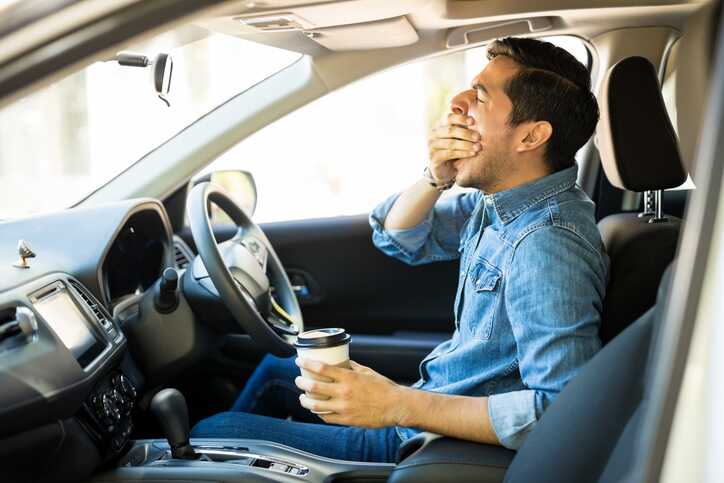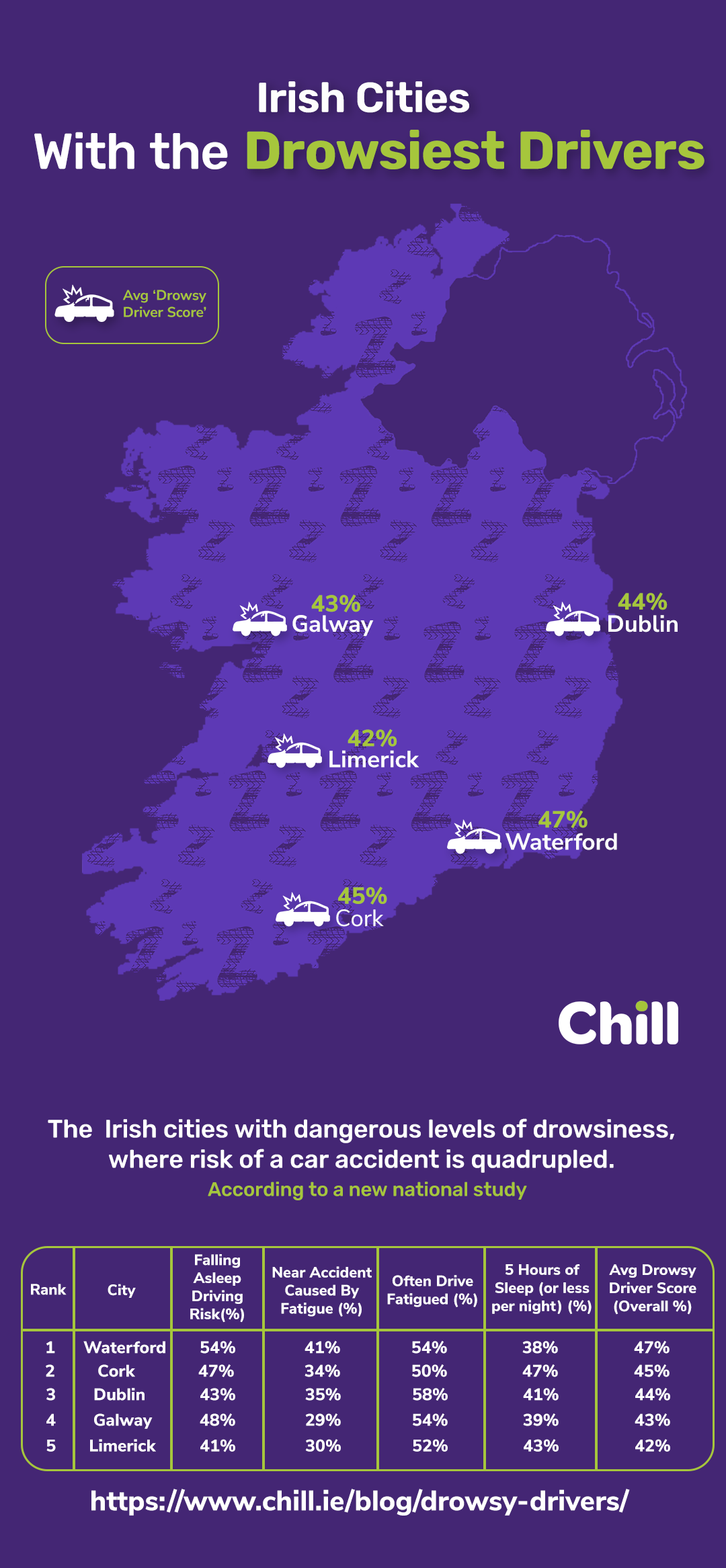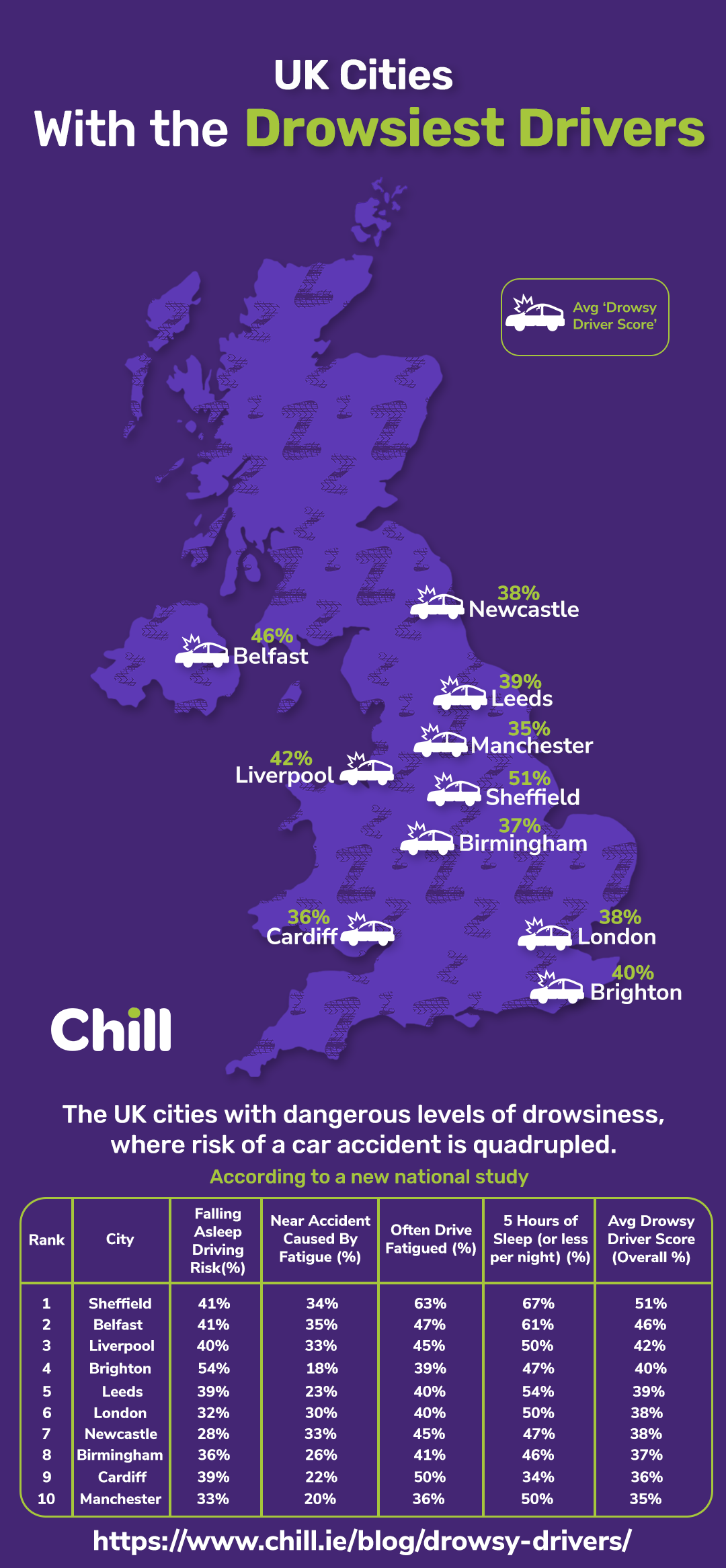New Study Reveals Increased Risks of Drowsy Driving This Summer
Drivers At Risk As Temperatures Increase

Sunshine, open roads, and the promise of adventure – summer road trips are a recipe for making memories. But with the freedom of the open road comes an overlooked and underreported hidden danger. It’s estimated that driver fatigue is a contributory factor in as many as one in five fatal crashes in Ireland every year, and is likely to account for up to 20% of all UK vehicle collisions.
Here at Chill, we conducted a new national study in the UK and Ireland, and the results revealed over 34.2 million motorists are estimated to be driving this summer in a state comparable to being over the legal alcohol limit - all due to insufficient sleep.
The study found that over two-fifths (45%) of drivers embark on long road trips with only 5 hours of sleep or less. Furthermore, a third (33%) report feeling more fatigued during summer journeys. Worryingly, despite feeling tired, one in three drivers (30%) say they will skip rest stops to save money on fuel this summer, putting themselves and others at risk.
Uncovering a worrying trend of tired drivers across the UK and Ireland, over two-fifths (43%) of respondents admit to feeling so fatigued, they’ve nearly fallen asleep at the wheel, and nearly three in ten (29%) have narrowly avoided accidents due to fatigue. Social stigma further exacerbates the problem, with nearly half (46%) fearing to admit tiredness, prioritising appearing competent over safety.
What is Driver Fatigue?
Driver fatigue is a state of exhaustion that impairs your ability to drive safely. It's similar to the effects of alcohol on the body, causing slower reaction times, reduced alertness, and difficulty concentrating on the road. This means you're less likely to notice hazards or react in time to avoid an accident. Even short periods of sleep deprivation can lead to fatigue, and the risk increases the longer you're behind the wheel. Don't be fooled by a quick burst of energy – drowsiness can creep up on you, making it a serious danger for anyone planning a long journey.
Why Summer Makes Drowsy Driving Worse
While fatigue is a year-round threat, several factors unique to summer make it a prime season for drowsy drivers and potential accidents. Analysing findings from the study, the data shows that a third (33%) feel more fatigued when driving in summer compared to other months and highlights additional challenges for road users during hotter spells.
Half of respondents (50%) identified windscreen glare from the sun as a major distraction, further compromising their ability to focus. Over two-fifths (41%) reported the heat itself as a significant contributor to drowsiness, with nearly a quarter (24%) admitting to feeling dehydrated while driving in summer – both factors impacting concentration and reaction times.
Studies Show 5 hours Sleep or Less Quadruples Your Risk of a Car Crash
| Sleep Duration | Risk of Crash |
|---|---|
| Less than four hours of sleep | 11.5 times the crash risk |
| Four to five hours of sleep | 4.3 times the crash risk |
| Five to six hours of sleep | 1.9 times the crash risk |
| Six to seven hours of sleep | 1.3 times the crash risk |
According to a study published in Nature and Science of Sleep, if you have less than five hours of sleep, you're just as likely to have a vehicle crash as if you were over the legal limit for alcohol. Not only this, a driver’s risk of a crash significantly increases with each hour of sleep lost the night before. The study shows when a driver had between zero and four hours of sleep the previous night, they may be up to 12 times more likely to have a crash.
Why Driving Tired is as Dangerous As Drink-Driving
Tired drivers have slower reaction times and suffer from reduced attention, awareness, and ability to control their vehicles. According to the National Sleep Foundation, in controlled studies where researchers were able to measure the amount of sleep deprivation, drunk and drowsy driving both result in a similar amount of crashes.
Ian O’Reilly, Head of Personal Line Sales and Road Safety Expert at Chill says: “Drowsy driving significantly impairs critical driving skills. Reaction times slow down dramatically, reducing the ability to brake for sudden hazards. Drivers experience a decline in focus, awareness of surroundings, and vehicle control, increasing the risk of accidents similar to those caused by drunk driving”.
A Guide to Sleep Duration and Blood Alcohol Concentration (BAC)
We at Chill have analysed scientific studies to reveal an estimated Blood Alcohol Concentration (BAC) equivalent based on sleep duration. The guide showcases alcoholic drink equivalent as well as outlining the effects on physical and mental well being if drivers are to get a set amount of sleep per night.
| Sleep Duration | Estimated Equivalent BAC | Estimated Alcoholic Drink Equivalent | Driving Disclaimers | Physical and Mental Effects |
|---|---|---|---|---|
| No Sleep | 0.10% | 4-5 drinks | This is a high BAC level. Driving is illegal and unsafe in Europe | Significant impairment of motor coordination and loss of judgement |
| Four to five hours of sleep | 0.08% | 3-4 drinks | This BAC level is the maximum drink driving limit for standard drivers in the UK | Impairment of balance, speech, vision and control |
| Five to six hours of sleep | 0.05% | 1-2 drinks | This BAC level is considered the legal limit and unsafe for standard drivers in Ireland | Impairment of reasoning and memory |
THE DATA: Over Two-Fifths of Drivers Regularly Hit the Road on the Equivalent of 4 Alcoholic Drinks
According to the data, 50% of UK and 41% of Irish road users are driving after getting just 5 or less hours sleep per night - the fatigue equivalent of being on or over the legal limit.
According to our analysis, after just 4-5 hours of sleep two-fifths of drivers included in the study are as impaired as someone at the legal drink-driving limit in the UK and over the limit in Ireland; the equivalent to having 3-4 alcoholic drinks.
The Sleep Foundation reports getting less than 6 hours of sleep weakens your reaction time, alertness, ability to multitask, and hand-eye coordination - similar to having a blood alcohol content (BAC) of 0.05%. If you stretch that wakefulness to 24 hours, which is essentially no sleep for a day, your driving skills become as compromised as someone with a BAC of 0.1% - well above the legal limit and extremely dangerous.
Four in Ten Felt so Tired They Nearly Fell Asleep at the Wheel
The data uncovers a worrying trend of drowsy drivers on a national scale, with 45% of Irish drivers admitting to feeling so fatigued they nearly fell asleep at the wheel, and a further 40% of drivers in the UK saying their own fatigue has caused them to fall asleep whilst driving.
Over a third (34%) of Irish drivers have admitted to coming close to causing an accident due to driver fatigue, with 24% of UK road users saying their tiredness levels also nearly caused them to have a fatal accident.
Young Drivers Are at the Highest Risk for Drowsy Driving Incidents
The study uncovers that young drivers (17-24 year olds) are the most vulnerable road users, with a quarter (25%) having either caused or come close to causing an accident due to fatigue. Even more concerning, a fifth (20%) of this age group never take breaks on long journeys, despite feeling tired.
2.1 Million Irish Drivers Face Heightened Drowsy Driving Risk
Compared to the UK, Irish drivers report feeling tired more often (57% vs 42%) with over two-fifths (41%) regularly getting less than 5 hours of sleep, quadrupling their risk of a fatigue-related accident. Alarmingly, 45% have admitted to being at risk of falling asleep at the wheel, and over a third (34%) have narrowly avoided an accident due to drowsiness.
Despite these risks, over half (52%) of Irish drivers only take breaks after 4-hour long stretches and over a third (36%) will quit rest stop on summer road trips this year to save money on fuel despite feeling too tired to drive
Concerningly, only 34% prioritise napping when tired. Instead, many resort to ineffective methods like opening windows (60%), loud music (42%), sugary drinks (49%), or even talking on the phone (14%).
The Irish Cities with the Drowsiest Drivers Where Risk of a Car Accident is QUADRUPLED

The study looks at driver fatigue levels on a city scale, analysing data from people who live closest to and in Irish cities, revealing the locations with the highest number of drowsy drivers. Topping the list is Waterford, where an alarming 54% of drivers confessed to feeling so drowsy behind the wheel that they risked falling asleep. This city also boasts the highest percentage of drivers who regularly operate vehicles while fatigued (54%) and those who get less than 5 hours of sleep per night (38%).
Cork, Dublin, Galway, and Limerick follow suit. All four cities report alarming numbers of drivers falling asleep at the wheel (ranging from 41% to 48%) and often experiencing fatigue while driving (between 50% and 58%).
RANKED: The UK Cities with the Drowsiest Drivers Where Risk of a Car Accident is QUADRUPLED

According to our study, Sheffield takes the unwanted crown for the drowsiest city in the UK. A staggering 63% of drivers in Sheffield admit to frequently driving while fatigued. This fatigue epidemic is further amplified by the alarming number of Sheffield drivers (67%) who report getting less than 5 hours of sleep per night. These combined factors create a recipe for disaster on Sheffield's roads, with 41% of drivers admitting to feeling so fatigued they nearly fell asleep at the wheel – a number mirrored in Belfast.
Danger Signals: How to Spot Drowsy Driving
Here are some key signs to watch out for, according to Ian O’Reilly, Head of Personal Line Sales and Road Safety Expert at Chill. If you notice any of the following signs of drowsy driving, you should look for the next available opportunity to stop and rest:
- Excessive yawning: Frequent, uncontrollable yawns are a telltale sign of fatigue. Your body is literally begging for sleep.
- Heavy eyelids: Do your eyelids feel heavy and struggle to stay open? This is a clear indicator of drowsiness.
- Drifting lanes: Are you unintentionally veering out of your lane or swerving on the road? This could be a sign of microsleeps – brief moments of unconsciousness while your eyes are open.
- Trouble remembering the last few miles: Can't recall how you got to a certain point on your journey? This memory lapse could be a symptom of drowsy driving.
- Feeling irritable or restless: Do you find yourself feeling unusually irritable or restless behind the wheel? This can be another indicator of fatigue.
How Can You Avoid Drowsy Driving?
- Break up long journeys: Plan rest stops every 2 hours, even if you don't feel tired initially. Get out, stretch your legs, and grab some fresh air.
- Try to avoid driving at these times: We all have times when sleepiness hits hardest. Identify your personal "drowsiness danger zones" (typically midnight to 6 am and early afternoon) and try to avoid driving during those periods.
- Prioritise sleep: A well-rested driver is a safe driver. Aim for a good night's sleep before your trip, and ideally for several nights leading up to it.
- Try not to solo drive: Travelling alone increases the risk of drowsy driving. Having a co-pilot allows you to share driving duties and keep each other alert.
- Ditch the distractions: Fiddling with the radio, air conditioning, or windows might seem like a way to stay awake, but it actually diverts your attention from the road. Pull over and rest instead of resorting to these tactics.
Methodology
- A 2,000 respondent survey was carried out in the UK and Ireland examining the habits of drivers
- Indexes were created using top percentage totals in the UK and Ireland
- Where the content refers to UK and Ireland percentages as a whole, we’ve calculated the averages for both
percentages found in each territory
- Keyword data was gathered using keyword.io
- Millions figure was calculated using percentage totals for UK and Ireland compared to population figures
- All data is correct and accurate as of 28th May 2024
Sources:
- Driver fatigue and crashes data in Ireland
- Driver fatigue and crashes data in the UK
- BAC stats were gathered from the Sleep Foundation and various government websites
- BAC levels and effects gathered from alcohol.org and aden.stanford.edu
- Fatigue and road accidents data gathered from a scientific study commissioned by The Metro
- Sleep duration and risk of crash table gathered using data from Science Daily
- Drink driving limits gathered from Alcohol Legislation and European Transport Safety Council

